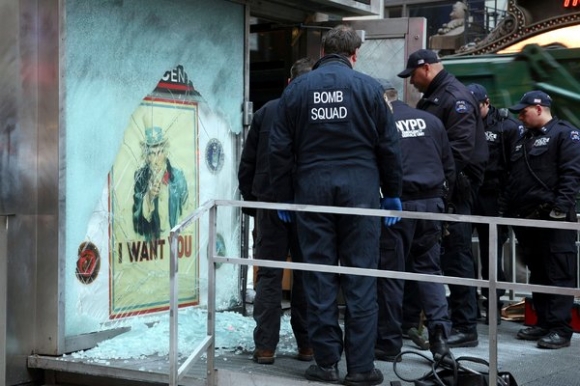A Brooklyn man has said that he will refuse to testify before a federal grand jury that is believed to be looking into the explosion of a homemade bomb in Times Square in 2008, setting the stage for a confrontation that could send him to jail for contempt of court.
Gerald Koch has said that he was not implicated in the 2008 bombing, but would risk contempt of court charges to protest what he called “government intimidation.”
A lawyer for the man, Gerald Koch, said that he had been subpoenaed as a witness and granted immunity, but that he was not a suspect in the bombing, which took place outside an armed forces recruitment center in the middle of the night and caused no injuries. Mr. Koch said in a written statement late last week that in 2009 he had been called before a previous grand jury investigating the case, but did not testify because he knew nothing about what happened.
“I will once again refuse to testify to the federal grand jury in ethical resistance to participation in a fruitless exercise of fear-mongering and government intimidation,” Mr. Koch wrote.
He noted that he could be jailed for up to 18 months, and added: “I accept this recompense, understanding that in doing so I will reinforce a tradition of defending individual rights in the face of state repression.”
Mr. Koch wrote that when he refused to testify in 2009 — citing the First, Fourth, Fifth and Sixth Amendments — the government told his lawyers that it believed he had been in a bar in 2008 or 2009 when someone mentioned knowing who was involved in the bombing. Mr. Koch, a former philosophy student at the New School who grew up in Florida, said he did not remember such a conversation.
The bombing took place at 3:43 a.m., when a low-grade explosive detonated, shattering a window and bending a metal door. Surveillance video showed a bicyclist dismounting, approaching the recruitment center, then riding away before the explosion. Police officials said the device used was similar to ones that exploded outside the British Consulate on East 42nd Street in 2005, and outside the Mexican Consulate on East 37th Street in 2007. No one was hurt in those blasts either.
The police recovered a blue Ross 10-speed bike that the bomber in Times Square was believed to have ridden; they have not commented publicly on any further progress.
Mr. Koch, 24, who identifies himself as an anarchist, is one of a group of activists who assist people arrested at political demonstrations, including some connected to the Occupy Wall Street movement.
Now, some of his friends have formed a group called the Support Jerry Committee; their Web site calls for people to “pack the court” on May 2 when Mr. Koch is due to appear in Federal District Court in Lower Manhattan.
“Jerry was the person everyone could count on to be waiting for them outside of jail, to support them in the courtroom, and to help with their legal defense,” the site says, adding: “It is now our turn to stand by Jerry.”
A member of the group, David Silverberg, said he believed Mr. Koch was being called because federal investigators wanted him to provide information about other anarchists and their activities, and called the grand jury “a fishing expedition.”
A spokeswoman for the United States attorney’s office in Manhattan did not respond to an e-mail seeking comment on that assertion.
Over the past few years, political activists have mounted anti-grand jury campaigns in several cities — including San Diego, Chicago and Seattle — complaining that the proceedings have been used as a coercive tool to collect information from people who are not accused of any crime. Prosecutors, however, have often seen refusals to testify as attempts to hinder investigations.
Defense lawyers are not present during grand jury proceedings, which operate secretly and are controlled by prosecutors. After hearing testimony, jurors are asked to determine whether there is enough evidence to return an indictment. Witnesses who are held in contempt after refusing to testify may be jailed until the completion of a grand jury term, often months.
Alan Vinegrad, the interim United States attorney in Brooklyn from 2001 to 2002, said prosecutors sometimes used grand juries to gather evidence that would not be available through other means.
“Relatives, friends, associates or people otherwise loyal to the target will often refuse to be interviewed and therefore have to be compelled to give testimony in the grand jury,” said Mr. Vinegrad, now a partner at the law firm Covington & Burling.
The results of grand jury resistance efforts have been mixed. The most recent example was in Seattle, where a grand jury was believed to be examining the vandalism of a federal courthouse last year. Some of those who were subpoenaed posed for photographs holding their fingers to their lips or made videotaped statements vowing not to testify.
Supporters of those called to testify before the grand jury said those people were not present when the vandalism occurred and suggested that they were subpoenaed because of connections to anarchists. In a written statement, prosecutors in Seattle said, “No one is investigated for what they believe; investigations focus on actions that constitute a crime.”
Two who refused to testify, Matthew Duran and Katherine Olejnik, were held in a federal detention center in Seattle for five months, spending part of that period in solitary confinement. Judge Richard A. Jones, of Federal District Court in Seattle, ordered their release in February after concluding that keeping them in custody would not elicit cooperation.
